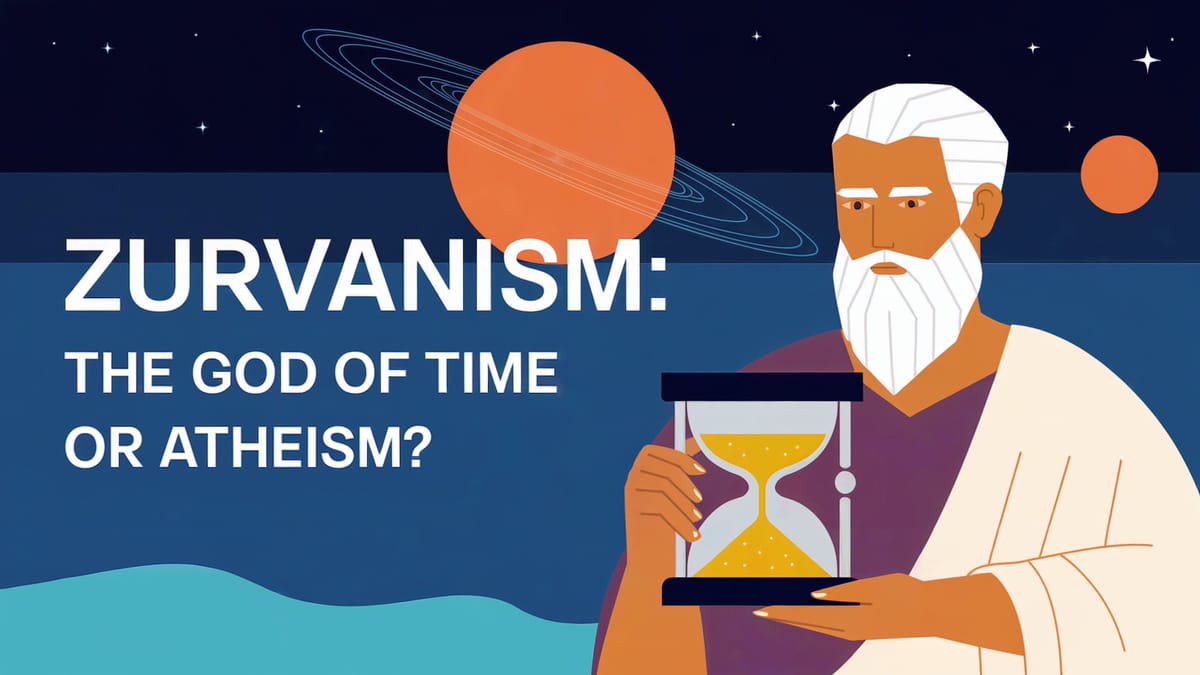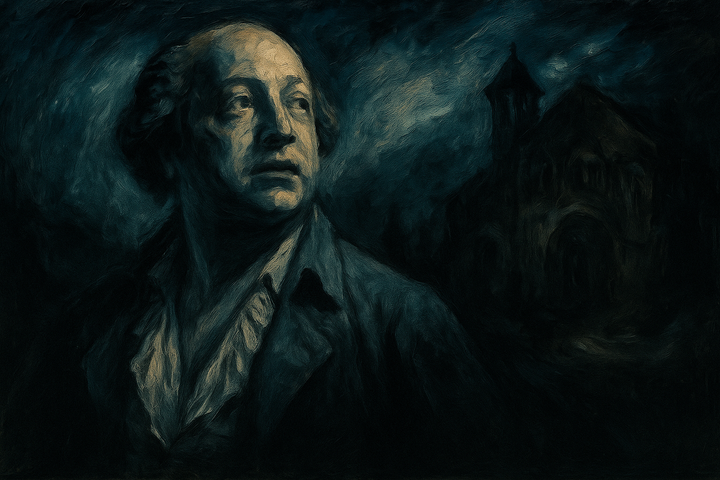Zurvanism: God of Time or Atheism?

Zurvanism, a distinctive offshoot of Zoroastrianism, emerged and flourished during the Sassanian Empire (224-651 CE). This ancient philosophy is often viewed as heretical by Zoroastrian orthodoxy, largely because it redefines the fundamental structure of the cosmos and its deities. By placing Zurvan, the hypostasis of infinite time and space, as the primordial creator deity, Zurvanism shifts the roles of Ahura Mazda and Angra Mainyu, leading to intriguing philosophical implications for the nature of good, evil, and free will.
Zurvanism: A Challenge to Zoroastrian Orthodoxy
In traditional Zoroastrianism, Ahura Mazda is the supreme uncreated god, the ultimate source of all that is good, who created the universe and bestowed upon humanity the responsibility of moral choice. Zurvanism, however, challenges this structure. In Zurvanite belief, Ahura Mazda and Angra Mainyu are twin brothers, both born from Zurvan, the embodiment of time. By making Ahura Mazda a created being rather than the uncreated architect of all, Zurvanism redefines the cosmic hierarchy and questions the inherent goodness of the universe's origins.
This reshaping of divinity also alters humanity's understanding of its place in the universe. If Ahura Mazda is a created being, his omnipotence comes into question, implying that the forces of good and evil are balanced by a superior, impartial entity—Zurvan. This perspective has profound implications for the nature of good and evil, and for humanity's role in striving for goodness.
The Problem of Evil and Free Will in Zurvanism
Zurvanism’s approach to explaining the problem of evil offers an interesting contrast to traditional Zoroastrianism. In standard Zoroastrian belief, Ahura Mazda embodies goodness, while Angra Mainyu represents evil. This duality is central, with a clear demarcation between the forces of light and darkness, each locked in a cosmic struggle. Humanity, in this worldview, has the gift of free will to choose between these two paths, contributing to the ultimate triumph of good over evil.
Zurvanism, however, takes a different approach. By positing Zurvan as the origin of both Ahura Mazda and Angra Mainyu, it suggests that both good and evil stem from a single, unified source. This understanding implies that evil is not an opposing force created separately, but rather an inherent part of the cosmic order. It also introduces a deterministic element: if both good and evil are born from Zurvan, who embodies infinite time, then the unfolding of events may be predetermined, governed by the inevitable progression of time. In this deterministic universe, free will becomes an illusion, secondary to the overarching influence of time.
This challenge to the concept of free will distinguishes Zurvanism sharply from mainstream Zoroastrianism, leading some to label it as leaning towards fatalism. By making time—the impartial Zurvan—the ultimate determinant, Zurvanism presents a universe where moral choice is less about individual responsibility and more about the inexorable flow of time and destiny.
Different Schools of Thought within Zurvanism
Zurvanism was not a unified belief system, and different interpretations flourished under its broad framework. Historical sources describe three distinct schools of thought within Zurvanism: Materialist Zurvanism, Fatalistic Zurvanism, and 'Classical' Zurvanism. Each of these schools presents a unique perspective on the role of time, matter, and human destiny.
Materialist Zurvanism
Materialist Zurvanism, heavily influenced by Greek philosophy, emphasized a materialistic view of the universe. This school denied the existence of a spiritual realm, asserting that everything in the cosmos originated from matter and would ultimately return to it. In this perspective, key Zoroastrian beliefs such as free will, heaven, and hell were rejected. Materialist Zurvanism saw human beings as products of the physical universe, with no inherent spiritual destiny beyond their material existence. This perspective positioned time and matter as the only true constants, offering a worldview that aligned closely with atheistic or agnostic philosophies.
Fatalistic Zurvanism
Fatalistic Zurvanism introduced another layer to Zurvanite thought by emphasizing the pre-ordained nature of existence. This school viewed human destiny as fixed, dictated by the movements of celestial bodies and the all-encompassing nature of Zurvan as infinite time. The stars and planets were seen as agents of fate, determining the course of human lives and events on Earth. In this worldview, human beings had little control over their actions or their outcomes, as everything unfolded according to a cosmic blueprint governed by time. This belief system offers a stark contrast to the Zoroastrian ideal of individual moral responsibility, where free will plays a central role in the cosmic struggle between good and evil.
'Classical' Zurvanism
'Classical' Zurvanism is considered the mainstream form of this branch. It retained much of the original dualistic framework of Zoroastrianism, maintaining the opposition between Ahura Mazda and Angra Mainyu as fundamental forces of good and evil. However, it positioned Zurvan above them as the ultimate creator, the progenitor of both deities. This form of Zurvanism sought to reconcile the existence of good and evil by placing them as equals under the supremacy of time, suggesting that the duality of light and darkness existed within a larger framework governed by Zurvan’s infinite nature.
Zurvanism's Legacy and Its Theological Implications
The legacy of Zurvanism is both intriguing and complex. Although the decline of the Sassanian Empire led to its disappearance as an organized belief system, the questions it raised about the nature of good, evil, and free will continue to influence theological discourse within Zoroastrianism and beyond.
Zurvanism’s portrayal of Ahura Mazda and Angra Mainyu as twin brothers born of time challenges the simplistic view of good versus evil. It suggests that both forces are intertwined aspects of a larger cosmic order, governed by time, and that neither can claim absolute supremacy. This view resonates with other philosophical traditions that perceive the universe as a balance of opposing yet interconnected forces.
The deterministic elements in Zurvanism, which see all events as unfolding according to the inexorable flow of time, present a stark challenge to the concept of free will. If everything is dictated by time, then individual actions are simply the realization of what was always meant to be. This worldview contrasts sharply with the emphasis on personal choice in orthodox Zoroastrianism, which teaches that each person has a vital role in the cosmic struggle between light and darkness.
Zurvanism: A Heretical Path or an Alternative Understanding?
While often labeled heretical, Zurvanism presents a valuable alternative perspective on the key issues of existence, morality, and divine power. By making Zurvan the source of both good and evil, it offers a potential resolution to the problem of evil that has perplexed theologians for centuries. In traditional monotheistic frameworks, the existence of an all-powerful, benevolent deity is often difficult to reconcile with the presence of evil in the world. Zurvanism sidesteps this dilemma by suggesting that both forces are part of a single, greater reality, ruled by time itself.
Moreover, Zurvanism provides an insightful commentary on the nature of belief and determinism. Its legacy prompts modern readers to consider the boundaries between faith, fate, and free will. Are our lives governed by cosmic forces beyond our understanding, or do we have the power to shape our own destinies? Zurvanism leans towards the former, offering a universe in which time dictates all, and humans are players in a story that has already been written.
Listen to Our Deep Dive Podcast
If you're interested in exploring Zurvanism in even greater depth, we have a podcast that takes a comprehensive look at this fascinating branch of Zoroastrianism. In the podcast, we discuss the historical context of Zurvanism, its different schools of thought, and its theological implications in more detail. You can listen to the podcast embedded below:
Conclusion: The Enduring Questions of Zurvanism
Zurvanism, though largely forgotten as a living religion, continues to leave its mark through the questions it raised and the challenges it posed to orthodox theology. By placing Zurvan as the ultimate source of both Ahura Mazda and Angra Mainyu, Zurvanism offered a radical rethinking of divine authority and cosmic order. It confronted the problem of evil not by denying its existence but by integrating it into a unified whole, governed by the inevitability of time.
The debates between free will and determinism, good and evil, remain central to many theological and philosophical discussions today. Zurvanism's brief yet impactful presence in the Sassanian Empire reflects humanity's enduring quest to understand the universe and our place within it. It reminds us that the search for truth often leads down unexpected paths—sometimes even heretical ones—but these paths can offer profound insights into the nature of existence, belief, and the timeless struggle between light and darkness.




